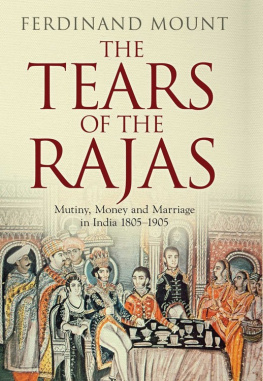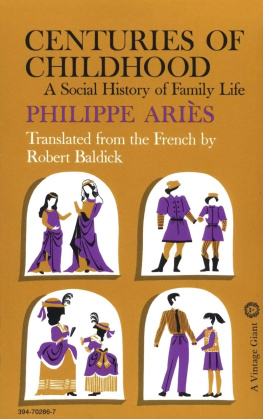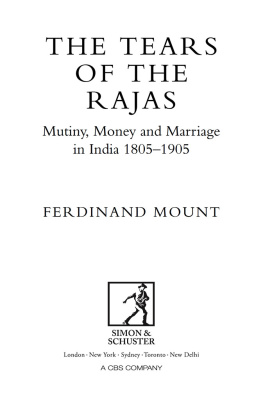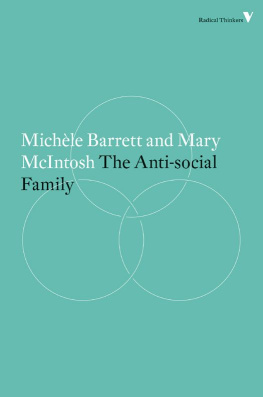THE
SUBVERSIVE
FAMILY
by the same author
THE THEATRE OF POLITICS
VERY LIKE A WHALE
THE MAN WHO RODE AMPERSAND
THE CLIQUE
THE
SUBVERSIVE
FAMILY
An Alternative History of Love and Marriage
FERDINAND MOUNT

THE FREE PRESS
A Division of Macmillan, Inc.
New York
Maxwell Macmillan Canada
Toronto
Maxwell Macmillan International
New York Oxford Singapore Sydney
To William, Harry and Mary
Copyright 1982, 1992 by Ferdinand Mount
All rights reserved. No part of this book may be reproduced or transmitted in any form or by any means, electronic or mechanical, including photocopying, recording, or by any information storage and retrieval system, without permission in writing from the Publisher.
The Free Press
A Division of Macmillan, Inc.
866 Third Avenue, New York, N.Y. 10022
www.SimonandSchuster.com
Maxwell Macmillan Canada, Inc.
1200 Eglinton Avenue East
Suite 200
Don Mills, Ontario M3C 3N1
Macmillan, Inc. is part of the Maxwell Communication Group of Companies.
First American Edition 1992
Printed in the United States of America
printing number
1 2 3 4 5 6 7 8 9 10
Library of Congress Cataloging-in-Publication Data
Mount, Ferdinand
The subversive family: an alternative history of love and marriage / Ferdinand Mount.
p. cm.
ISBN 0-68-486385-5
eISBN: 978-1-451-60328-6
1. FamilyHistory. 2. LoveHistory. 3. MarriageHistory.
I. Title.
HQ503.M68 1992
306.8dc20 92-30779
CIP
The author and publisher are grateful to the editors of Encounter for permission to reprint extracts from The Dilution of Fraternity, first published in October 1976.

CONTENTS

PREFACE TO THE AMERICAN EDITION
When this book was first published in Britain, it was variously described as anarchist, romantic, reactionary, ludicrous, magnificent, apocalyptic and a joy because it vindicates the natural affections. On closer inspection, these wildly discordant responses sorted themselves out into three clearly markedand highly revealinggroups.
The first (and I like to think the largest) group of readers seemed to experience a pleasant shock, or at any rate a tremor, of recognition. The version of the history of the family which I described corresponded to suspicions, intimations, stray pieces of evidence that had come their way in the course of their researches or their daily lives. Material which the conventional wisdom had instructed them to disregard as trivial, marginal or merely anecdotal could, it seemed, be collated and arranged to constitute an alternative history of family life, one in which personal affection and private aspiration played a rather larger part and impersonal social forces were not always dominant; a history in which the notorious, supposedly inexorable progress from feudalism to capitalism, and from the extended family to the nuclear family, began to dissolve.
All this was anathema to the second group of readers, who, if not themselves actually marxists, had come to rely rather heavily on the scheme of social history which Marx and Engels had left behind. Some of these critics frothed with rage; others affected a weary superiority. Any attempt to suggest that personal affection (or even, to use the word which must not be spoken, Love) might be an important and continuing factor in human history was to be dismissed as bourgeois sentimentality.
From some Catholics and traditional moralists came a different, indeed, almost opposite criticism. This third group of readers agreed that, yes, the family was a bulwark of independence against the State and a refuge from the storms of history, but it was the Church that had built this refuge, and I was mistaken in lumping the Church in with the other oppressive forces menacing family life. Far from being too cosy, sentimental and conservative in its approach, my book showed a dangerous streak in its refusal to understand the positive social role played by Christianity.
As for its implications for the present and the future state of marriage and the family, the quasi-Marxists accused me of an absurd complacency about the survival of an institution which was bound to crumble away. The traditionalists accused me of complacency too, although of a different type. They shared the belief that the family was crumbling, but they also believed that it could be revived if only the old social cement was remixed and generously applied: divorce made more difficult, abortion forbidden, and so on.
To carry the story up to the present date is simple enough. As the study of social history becomes ever more popular, an increasing body of evidence tends to support the conclusions first given coherent expression by Dr. Peter Laslett and the Cambridge Group for the History of Population and Social Structure.
Many of my themes have since been given securer underpinning in such scholarly works as Keith WrightsonsEnglish Society 1580-1630, R. B. OuthwaitesMarriage and Society Martine SgalensLove & Power in the Peasant Family, and the diverse and distinguished writings of Linda Pollock, Richard Smith and, especially, Alan Macfarlane. I certainly would not dare to claim that a new consensus reigns, but it is clear that the old conventional wisdom, once so widely shared by social historians, anthropologists, and literary scholars, has had to be rearranged a little.
As for the here and now, the evidence of the intervening decade only reinforces my tentative conclusions about the enduring appeal of popular marriage, that is, fallible marriage in which equality, privacy and independence are sought, with an indifference to risk and a concentration of desire which pays little or no attention to social expectations.
I wish here only to repeatwith a little more emphasis for those who missed it the first timethat freedom is not the same as happiness. The quest for liberty always has a bleak and lonely aspect. This insistence on making and unmaking our own relationships without let or hindrance from society is anything but a soft option. Nor is the project undertaken because it offers a greater assurance of contentment, either for ourselves or for our children, than our forefathers enjoyed.
To claim that, in our part of the world, marriage was never a purely commercial arrangement but always aroused the most intense human emotions is not to claim that those emotions were always pleasant. There never was a golden age in which brutality, neglect and desertion were unheard of. And we have small reason to expect that there ever will be.
The modern insistence on liberty in personal relationships derives from that most modern, most protestant of reasons, the dignity of the individual. It is likely to be reversed only by a wholesale return to the ideals of a collective, tribal society. And anyone who sees such a development shimmering on our present horizon must have a bizarre set of binoculars.
In setting out its alternative version, this book does not claim that this is the way we ought to be. It contents itself with claiming that, in North-West Europe especially but elsewhere too, this is the way we were, are and, most probably, will go on being.
This is a strictly European history. It has hardly a word to say about America. Yet what applies to the British Isles, to Scandinavia and to Germany must apply with still greater force to the United States; for when we come to chart the social world of modernity, we in Europe have to recognise that we may be its sources and its tributaries, but America is the main channel. The traditions of family life which were carried across to the New World were stripped down to their essentials and stand there to this day as plain and unadorned as the furniture in a New England parlour. This book might even serve as a prologue to that great history of the American Family which has yet to be written.
Next page






